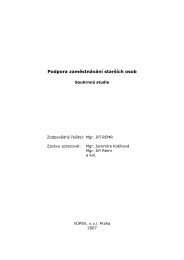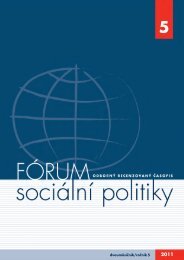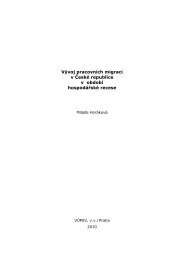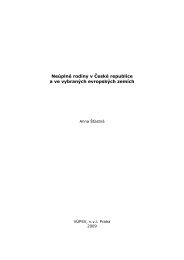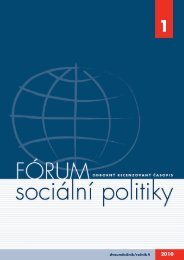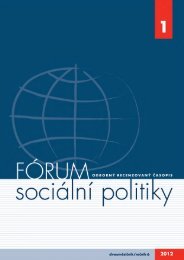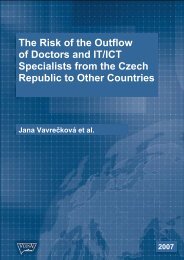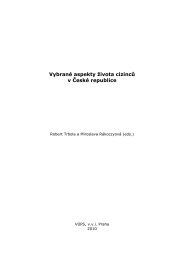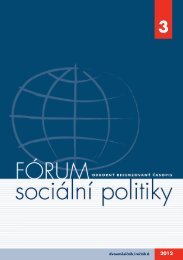Ä. 2/2009 - Výzkumný ústav práce a sociálnÃch vÄcÃ
Ä. 2/2009 - Výzkumný ústav práce a sociálnÃch vÄcÃ
Ä. 2/2009 - Výzkumný ústav práce a sociálnÃch vÄcÃ
You also want an ePaper? Increase the reach of your titles
YUMPU automatically turns print PDFs into web optimized ePapers that Google loves.
Summaries of selected articles<br />
Long-term Reforms of Welfare and Governance - p. 2<br />
The social states of Europe are in a long-term process of<br />
transformation linked to changes in the basic characteristics<br />
of society. The revolutionary period of transition from<br />
industrial to post-industrial society in European social states<br />
necessitated the creation of new forms of governance and<br />
methods of managing and administrating public policies. The<br />
summary paper looks at welfare reforms. It identifies the<br />
main types of reforms that can be observed in present-day<br />
Europe and examines their possible links to the social state<br />
systems they are taking place under. To conclude the paper,<br />
the features of the governance model built on three<br />
interlinked tiers are mentioned.<br />
Keywords: social state, welfare reform, new public<br />
management, governance<br />
The Czech Labour Market from the Point of View of Selected<br />
Forms of Flexibility and Quality of Working Life - p. 5<br />
In this paper we look at current labour market developments<br />
concerning atypical forms of work relations, time and<br />
nominal flexibility and the quality of work. To this end we<br />
draw on the „Labour Force Survey“ for 2004–2007. Using its<br />
data we document areas of the substance of work activities,<br />
forms of work relations and job stability, the use of parttime<br />
work and second jobs, the customary working week<br />
and overtime and the specific temporal and spatial<br />
arrangement of work. Just 8.5% of workers perform parttime<br />
work; we find a slightly higher percentage among<br />
groups with an increased risk of marginalisation on the<br />
labour market. At the same time, the relatively long duration<br />
of work relations, which is also substantially influenced by<br />
workers' age, is confirmed. Though relatively small overall,<br />
the proportion of part-time work is greater and increasing<br />
among the specific categories of the disabled and mothers<br />
of children under 7 years of age. Despite a slight fall in the<br />
past ten years the average number of hours worked per<br />
week remains relatively high in the Czech Republic. Longer<br />
hours are usually found in management professions, in<br />
certain blue-collar professions and among younger<br />
respondents (especially men). The proportion of workers<br />
working in „non-standard“ time arrangements (e.g. shift<br />
work or work on weekends) is also relatively high. In<br />
a number of areas (especially the scheduling of work) the<br />
Czech labour market appears considerably flexible, but job<br />
stability is relatively high and the proportion of temporary<br />
work contracts is small. One reason for this may be the<br />
considerable emphasis that workers in the Czech Republic<br />
place on job certainty.<br />
Keywords: labour market, atypical employment, flexibility,<br />
quality of work<br />
Flexible Work Arrangements as a Tool for Balancing Working<br />
and Family Life - p. 14<br />
The flexibility of labour and the flexibility of the labour market as<br />
a whole, or segments thereof, have become a topic of recent<br />
debate. In this paper we ask the following questions: to what<br />
extent do flexible job arrangements make it easier to strike<br />
a good balance between caring for children and paid<br />
employment and what are the consequences of the use of these<br />
arrangements in the corporate environment Using a case study<br />
of a food processing company we demonstrate the individual<br />
experiences of mothers of dependent children with flexible<br />
working arrangements. When analysing the semi-structured<br />
interviews we focus on the status of those who use an<br />
alternative work arrangement in the corporate structure. The<br />
interviews reveal negative consequences of the insufficient<br />
protection afforded to employees practising alternative working<br />
arrangements. Pressure to deliver good results and long hours<br />
spent in the workplace put those not working in standard<br />
arrangements in a marginalised role. In the light of this analysis<br />
it would seem that flexible work arrangements in the Czech<br />
Republic are only positively reflected in an increased quantity of<br />
jobs but not in the quality of jobs.<br />
Keywords: flexible work arrangement, flexicurity, work/life balance,<br />
employers, corporate culture, gender and the labour market<br />
Supplemental Pension Insurance is Unsellable Without State<br />
Contributions - p. 23<br />
In the Czech Republic, the creation of supplemental pension<br />
insurance with a state contribution - at the government's<br />
injunction - had a specific political and ideological background<br />
expressed by the marketing term „the civic principle“. It<br />
constituted the rejection of state support for the system of<br />
corporate pension provision, or today's „institutions for<br />
occupational retirement provision“. The legislation on<br />
supplemental pension insurance needlessly complicates Czech<br />
law; since the Czech Republic's accession to the EU it has<br />
conflicted with EU directives on life assurance. Supplemental<br />
pension insurance reforms have been and remain controlled<br />
by a lobby. The product has the highest state appropriation in<br />
the world, but over the long term the average actual additional<br />
value received by clients is zero. „Home saving“ competes<br />
with supplemental pension insurance for appropriations and<br />
(non-) sales. The reform of home saving was an exemplary<br />
form of „easy money“ for building societies. The work<br />
underway to reform supplemental pension insurance is a very<br />
complicated attempt to continue with „easy money“ for<br />
a limited number of financial groups.<br />
Keywords: supplemental pension insurance, occupational<br />
pensions, pension saving, home saving, insurance law, EU<br />
pension directives.




